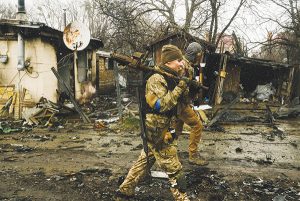As the war in Ukraine moves into a second month, its global economic reverberations are increasing. Energy markets, agriculture, bonds, precious metals — all are roiled as the fighting takes its uncertain path.
But beyond economics, longer-term geopolitical themes are emerging, as countries are increasingly forced to pick sides for or against Russian President Vladimir Putin. For US strategic planners, who know that China and not Russia is the greatest long-term threat to US interests, the ways in which the Ukrainian war and its aftermath will affect Asian countries is of paramount importance.
How does the conflict look through Indo-Pacific eyes, and what geopolitical changes may emerge?
President Xi Jinping of China has maintained a lean-towards-Putin position. Beijing will not condemn the invasion in the United Nations or elsewhere, will probably not adhere to Western sanctions, and will almost certainly provide Moscow with financial assistance and access to capital.
But as Xi watches the weak and increasingly barbaric performance of the Russian military, alongside the global outpouring of support for Ukraine, he may begin to have second thoughts about his “no limits†friendship with Putin.
The Chinese will also consider the implications of the Ukrainian invasion on their own long-term planning concerning Taiwan. Watching the world’s democracies line up firmly behind Ukraine cannot be encouraging to a government that considers the island a renegade province. Same with the fierce resistance by the Ukrainians, aided by massive military assistance from the US and Europeans.
Look for China to start steering more of a middle course between Putin and the West. While Beijing is unlikely to join in the global criticism of Putin, its policies will be more measured and patient. Longer term, the temptations of Russia’s vast Siberian regions — full of oil, gas, timber, arable land, fresh water, strategic minerals — beckon. A weaker Russia might be a better Russia for the Chinese.
Bottom line: China has no interest right now in a new Cold War, a broken set of global supply chains, or downward pressure on overall growth internationally. This is especially true in what is a Chinese Communist Party election year, during which Xi hopes to win a third term as leader.
On top of those concerns, the rest of the neighbourhood is growing increasingly
dangerous for China. Japan, the region’s second-largest economy, has aligned eagerly with the Western democracies against Russia, fully joining the sanctions regime to the surprise of many observers. The Japanese public is overwhelmingly supportive of Ukraine, giving the conservative government of Fumio Kishida, which took power last fall, an opportunity to tighten security ties to the US While the Japanese military (for now, anyway) remains a self-defense force, Tokyo will provide humanitarian assistance and significant diplomatic support to Ukraine.
The Japanese also view the war in Ukraine through the prism of their own territorial dispute with Russia. The four islands the Japanese call their Northern Territories — or, to Russians, the Kurils — have been held by Moscow since the end of World War II, and the dispute is still bitter eight decades later. Historically, Japan has no love of Russia (including the Russo-Japanese war over a century ago) and will remain a solid force economically and diplomatically against Moscow.
In South Korea, last month’s elections returned the conservative party to power, and President-elect Yoon Suk-yeol has already reached out to Ukrainian leader Volodymyr Zelenskiy for a meeting after the fighting ends. Yoon has also begun to lay the tracks for a less strained relationship with Japan, something Washington has long hoped for. Seoul is increasingly concerned about claims by the North Korean regime — which survives in part thanks to support from Russia as well as China — that it launched an intercontinental ballistic missile in late March. The idea of turning the Quad (the diplomatic alignment of Australia, India, Japan and the US) into a Quint including South Korea is gaining momentum.
The most significant outlier among democratic nations in condemning Putin is India, which has longstanding ties to Russia, notably in military sales (Russia supplies 70% of India’s high-end defense systems).
The Indians, dependent on Russia for much of their military hardware, thus far have opted for neutrality in the conflict. Washington, conscious of the need to keep India part of the counter-China coalition, has so far given it a pass. If the war drags on and Russian atrocities pile up, expect more pressure from the US and other democracies that may shift the Indian stance. Whether this causes a real rift affecting the momentum of Quad is a big worry for Western planners.
The US and Europeans will probably work on both India and China to move them to a more critical posture toward Russia. It will probably not be a successful campaign.
—Bloomberg
James Stavridis is a Bloomberg Opinion columnist. He is a retired US Navy admiral and former supreme allied commander of Nato, and dean emeritus of the Fletcher School of Law and Diplomacy at Tufts University. He is also chair of the board of the Rockefeller Foundation and vice chairman of Global Affairs at the Carlyle Group. His latest book is “2034: A Novel of the Next World Warâ€
 The Gulf Time Newspaper One of the finest business newspapers in the UAE brought to you by our professional writers and editors.
The Gulf Time Newspaper One of the finest business newspapers in the UAE brought to you by our professional writers and editors.

